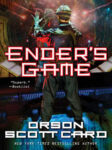
by Orson Scott Card, 1977, 1985, 1991
Fast, easy read, recommended on Book-A-Day calendar. Science fiction tale about a little boy, Ender Wiggin, who is sent to battle school at the age of 6 and trained to be the Commander who will save the world from the buggers. He does after 5 years of brutal training. Reading about it is tedious at times – battle after battle in simulators. But, he is an appealing character because he is so young. He has a brother, Peter, who is pure evil. His sister, Valentine, is pure sweetness. Peter ends up ruling earth after Ender saves it. Valentine and Ender end up colonizing a bugger planet. Ender finds a pupa at the very end, and it’s a new queen who relays all her thoughts to him – that they were so sorry they attacked the first time, that they were never going to do that again, and would he take her someplace where they can recolonize? He gently carries the pupa with him for the rest of his life.
Here is the last paragraph:
“So they boarded a starship and went from world to world. Wherever they stopped, he was always Andrew Wiggin, itinerant speaker for the dead, and she was always Valentine, historian errant, writing down the stories of the living while Ender spoke the stories of the dead. And always Ender carried with him a dry white cocoon, looking for the world where the hive-queen could awaken and thrive in peace. He looked a long time.”
Here’s how the Book-A-Day described the book:
“Spellbinding Science Fiction: The Wiggin children are unusual, even for the unusual world in which Ender’s Game, by Orson Scott Card, unfolds. There’s the oldest, Peter, a power-mad sociopath; Valentine, the sister who turns her eloquence to Peter’s service, and then there’s Ender, their little brother who is singled out by the authorities as a military genius. Set at some indeterminate time in the planet’s future, when humanity has been at war with the Formics, an insect-like alien race, for 100 years, Ender’s Game might appear at first blush to be the most formulaic of science fiction novels. But just try to put it down–or to stop listening to the riveting unabridged audiobook read by Stefan Rudnicki, Harlan Ellison, and others.”
In the Introduction the author wrote for this edition, he explains how he came to write the book. He’s Mormon and his brother is in the military. His religion and the basic training his brother went through influenced him. He also loved science fiction, especially Asimov’s Foundation trilogy.